Nicole schreibt...
Moscow 2016 |
 |
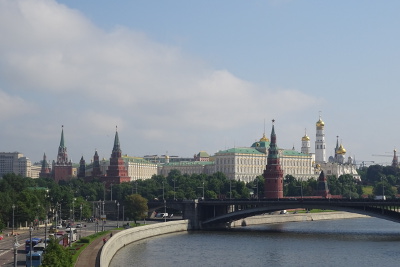 Following my trip to St. Petersburg in 2007, that pretty much cleaned up any prejudices I had harboured against Russia and the Russians as a child of the Cold War, I knew that I'd also want to see Moscow some day. However, for many years Moscow led any global ranking of the world's most expensive cities with hotels being particularly extortionate. But with Putin pissing off the West more regularly in recent years, sanctions were introduced that made the Russian Rouble tank badly Knowing it was a golden opportunity to finally visit Moscow, I seized the chance and got four nights in a five-star hotel around the corner of the legendary Bolshoi Theatre including flight for around 450 Euro per person. So thank you, Mr Putin for being a bit of a dick.
Following my trip to St. Petersburg in 2007, that pretty much cleaned up any prejudices I had harboured against Russia and the Russians as a child of the Cold War, I knew that I'd also want to see Moscow some day. However, for many years Moscow led any global ranking of the world's most expensive cities with hotels being particularly extortionate. But with Putin pissing off the West more regularly in recent years, sanctions were introduced that made the Russian Rouble tank badly Knowing it was a golden opportunity to finally visit Moscow, I seized the chance and got four nights in a five-star hotel around the corner of the legendary Bolshoi Theatre including flight for around 450 Euro per person. So thank you, Mr Putin for being a bit of a dick.
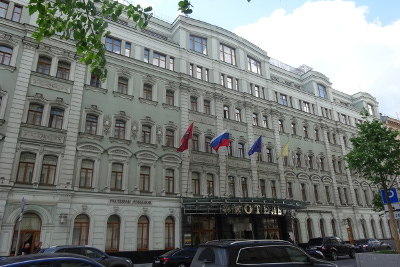 Off we went with Russia's national airline Aeroflot from Duesseldorf to Sheremetyevo, Moscow's oldest airport which is now strictly divided between the grotty old terminal F of Soviet times and the shiny new terminal D where, luckily, our flight came in (and would depart). Immigration and baggage handling were swift and we were greeted by our airport pick-up in the arrival hall, which I had asked the hotel for after deciding that with big suitcases and a show waiting the first evening, I really didn't want to hassle with public transport in a foreign city with unfamiliar writing. Which was all fine and well until we hit infernal gridlock on Tverskaya, Moscow's main road into the city where major construction was going on. Yet we still made it to our hotel, the lovely Peter I., in good time, so there was ample time left to unpack, freshen up and find dinner before walking over to the Lenkom Theatre.
Off we went with Russia's national airline Aeroflot from Duesseldorf to Sheremetyevo, Moscow's oldest airport which is now strictly divided between the grotty old terminal F of Soviet times and the shiny new terminal D where, luckily, our flight came in (and would depart). Immigration and baggage handling were swift and we were greeted by our airport pick-up in the arrival hall, which I had asked the hotel for after deciding that with big suitcases and a show waiting the first evening, I really didn't want to hassle with public transport in a foreign city with unfamiliar writing. Which was all fine and well until we hit infernal gridlock on Tverskaya, Moscow's main road into the city where major construction was going on. Yet we still made it to our hotel, the lovely Peter I., in good time, so there was ample time left to unpack, freshen up and find dinner before walking over to the Lenkom Theatre.
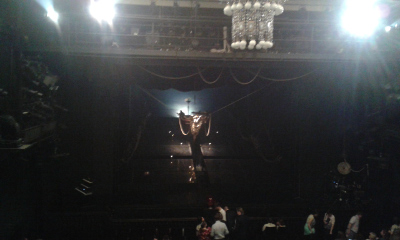 I had never really thought of Moscow as a musical theatre destination (not least because I don't speak a single word of Russian), but there was one show I really wanted to see: The rock opera "Juno & Avos" that opened in 1981 and has been running in repertory ever since (!). I had received a CD-R of this many years ago with no further information whatsoever, so it gathered dust unheard. Until, a few years ago, I came by the book Glorious Misadventures by Owen Matthews, a biography of the Russian seafarer and explorer Nikolai Rezanov who tried to conquer Northern America for the Russian Empire. He did get hold of Alaska and swathes of the Canadian coast and got as far south as San Francisco, where the Spanish were safely ensconced. It was here Rezanov met the 15-year old Conchita, daughter of the governor, and started a rather unwise love affair with her. He promised he'd be back some day to marry her and apparently did have honorable plans, but alas died on the way back to St. Petersburg and the court. And Conchita never married another man. It's this story that Juno & Avos tells, the title referring to Rezanov's ships. Now don't go expecting a sappy love story though, because Juno & Avos was clearly inspired by Jesus Christ Superstar and staging-wise firmly stuck in the 80s, with people singing into hand-held mics, accompanied by a small and noisy rock band. While I still didn't understand a word and not much made sense, I was still thrilled to be seeing this legend of Russian musical theatre live on stage, especially since they only do a few performances each month and I really didn't know if I could catch it.
I had never really thought of Moscow as a musical theatre destination (not least because I don't speak a single word of Russian), but there was one show I really wanted to see: The rock opera "Juno & Avos" that opened in 1981 and has been running in repertory ever since (!). I had received a CD-R of this many years ago with no further information whatsoever, so it gathered dust unheard. Until, a few years ago, I came by the book Glorious Misadventures by Owen Matthews, a biography of the Russian seafarer and explorer Nikolai Rezanov who tried to conquer Northern America for the Russian Empire. He did get hold of Alaska and swathes of the Canadian coast and got as far south as San Francisco, where the Spanish were safely ensconced. It was here Rezanov met the 15-year old Conchita, daughter of the governor, and started a rather unwise love affair with her. He promised he'd be back some day to marry her and apparently did have honorable plans, but alas died on the way back to St. Petersburg and the court. And Conchita never married another man. It's this story that Juno & Avos tells, the title referring to Rezanov's ships. Now don't go expecting a sappy love story though, because Juno & Avos was clearly inspired by Jesus Christ Superstar and staging-wise firmly stuck in the 80s, with people singing into hand-held mics, accompanied by a small and noisy rock band. While I still didn't understand a word and not much made sense, I was still thrilled to be seeing this legend of Russian musical theatre live on stage, especially since they only do a few performances each month and I really didn't know if I could catch it.
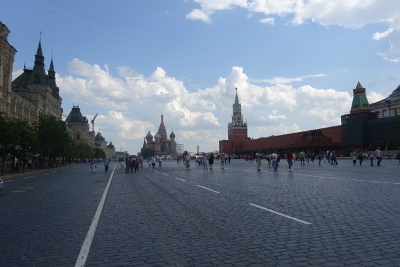 Next day, the trip started properly with a wander down to the famous place in all of Russia, the Red Square beside the Kremlin. The name really being wrong since the Russian adjective krasnaja can mean both 'red' and 'beautiful' and it started life simply as The Beautiful Square centuries ago. Having known it mostly as a staging ground for military parades, it was a little strange and yet lovely to see it as tourist central now with hundreds of people milling about everywhere.
We went for a walk around the Kremlin, poked into St. Basil's Cathedral (the one with the funny colorful onion domes) and continued (past the street crossing from hell) to the Arbat, once Moscow's famous pedestrian zone, today pretty much a tourist trap with cafes, restaurants and souvenir shops.
Next day, the trip started properly with a wander down to the famous place in all of Russia, the Red Square beside the Kremlin. The name really being wrong since the Russian adjective krasnaja can mean both 'red' and 'beautiful' and it started life simply as The Beautiful Square centuries ago. Having known it mostly as a staging ground for military parades, it was a little strange and yet lovely to see it as tourist central now with hundreds of people milling about everywhere.
We went for a walk around the Kremlin, poked into St. Basil's Cathedral (the one with the funny colorful onion domes) and continued (past the street crossing from hell) to the Arbat, once Moscow's famous pedestrian zone, today pretty much a tourist trap with cafes, restaurants and souvenir shops.
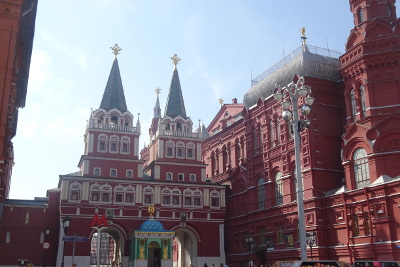
|
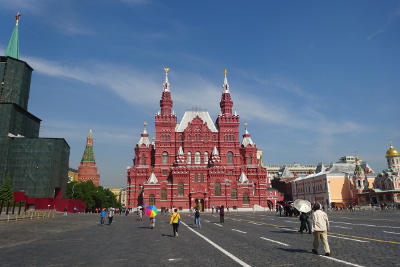 |
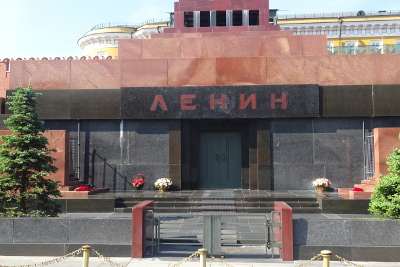
|
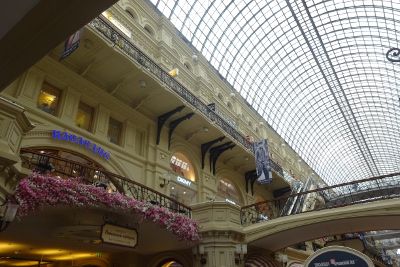 |
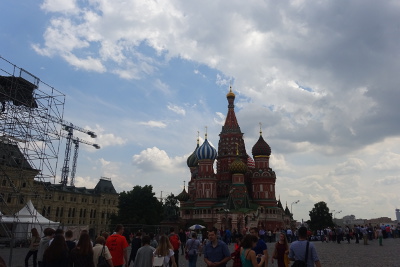
|
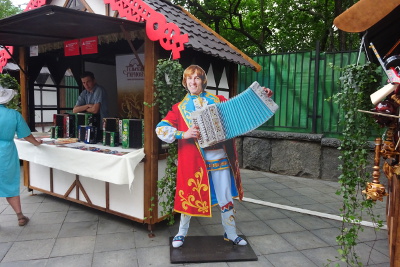 |
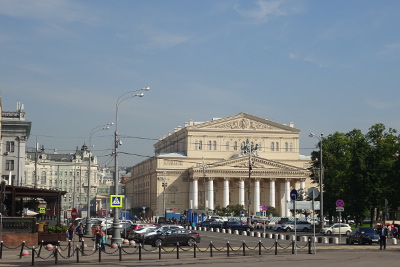 The advantage of being able to afford a snazzy five-star hotel meant that the place came with a nice gym / pool area in the basement where we could take a nice break in the afternoon before tackling the biggie: The opera Boris Godunov at the world-famous Bolshoi Theatre. Well, actually the Bolshoi is more famous for its ballet but sadly in this case scheduling was not on my side and they weren't doing one of their big ballets that weekend.
So four hours of opera in Russian it was and to my immense relief they catered to all the tourists with English surtitles. And not caring for our modern hectic times, they did three intermissions between the four acts plus long scene changes behind closed curtains in utter silence which all drew the evening out endlessly and I admit that I must have fallen asleep during the last act. When I opened my eyes, good old Tsar Boris was lying dead on the stage and I had no idea what happened. Overall though it was an interesting history lesson on Russia in pre-Romanov days and an absolutely sumptous spectacle with amazing stage sets to boot.
The advantage of being able to afford a snazzy five-star hotel meant that the place came with a nice gym / pool area in the basement where we could take a nice break in the afternoon before tackling the biggie: The opera Boris Godunov at the world-famous Bolshoi Theatre. Well, actually the Bolshoi is more famous for its ballet but sadly in this case scheduling was not on my side and they weren't doing one of their big ballets that weekend.
So four hours of opera in Russian it was and to my immense relief they catered to all the tourists with English surtitles. And not caring for our modern hectic times, they did three intermissions between the four acts plus long scene changes behind closed curtains in utter silence which all drew the evening out endlessly and I admit that I must have fallen asleep during the last act. When I opened my eyes, good old Tsar Boris was lying dead on the stage and I had no idea what happened. Overall though it was an interesting history lesson on Russia in pre-Romanov days and an absolutely sumptous spectacle with amazing stage sets to boot.
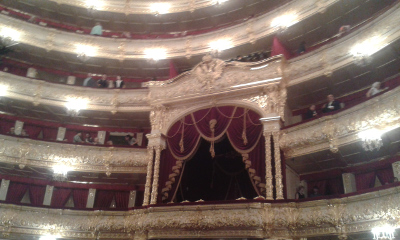
|
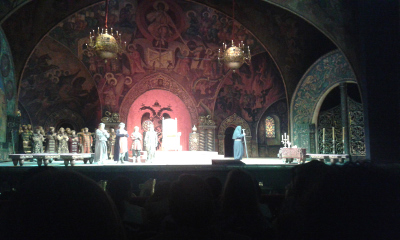 |
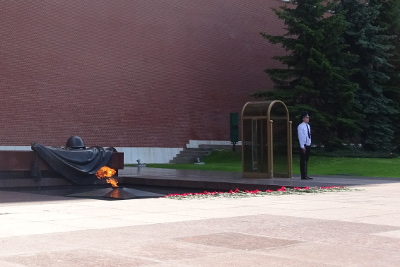
|
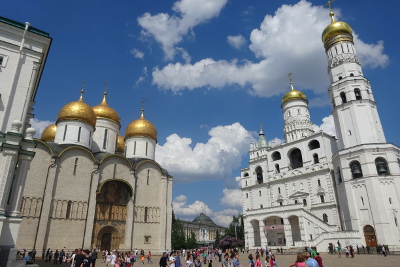 |

|
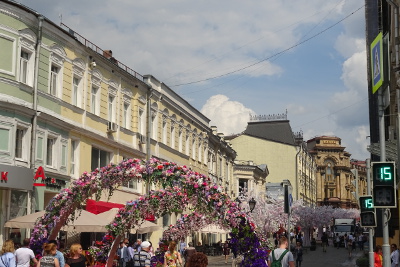
|
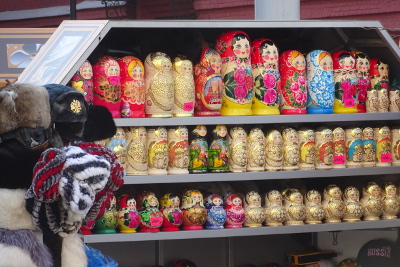 |
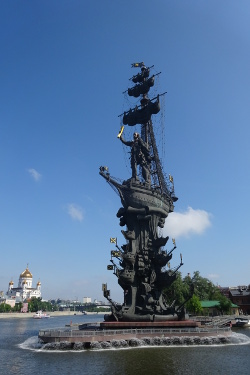 Sunday began with something I had really been keen on doing, a walk along the river to Gorky Park south of the city centre. Despite what David Hasselhoff may claim, his bland pop ditty Looking for Freedom had never been Germany's theme tune during the heady days of autumn 1989 when the Berlin Wall came down and communist East-Germany was no more - it was the rock ballad Winds of Change by our own rock group The Scorpions which began with the line "I follow the Moskva down to Gorky Park listening to the winds of change..." so I always felt I wanted to do that.
It helped that it's a lovely walk on a sunny summer morning passing the immense Cathedral of Christ the Saviour, which had been destroyed by Stalin in 1931 and was not rebuilt until Moscow's 850th birthday in 1997 and the equally immense monument to Tsar Peter The Great (he, who ironically had St. Petersburg built as a new capital and turned Moscow into a backwater for more than 200 years).
Across the river from Gorky Park was another destination I was keen on, the summer estate of Leo Tolstoy where the great man lived with his family on what was then the outskirts of Moscow. Let me confess that I've read neither Anna Karenina nor War and Peace, but right on time the BBC came up with a fantastic new TV adaptation of War and Peace this spring, so at least I had some clue what the man had been on about. The house itself was also just nice to see as such, providing an insight into Russian country life at the turn of the century. There's even a second little museum nearby, a few rooms entirely dedicated to his literary output with some interesting stuff on both his big novels and some smaller ones. Photos were verboten in both of them, unfortunately. After a last stop to actually peek inside the huge cathedral on the way back we flopped in Alexandrov Gardens for lunch before returning to the hotel.
Sunday began with something I had really been keen on doing, a walk along the river to Gorky Park south of the city centre. Despite what David Hasselhoff may claim, his bland pop ditty Looking for Freedom had never been Germany's theme tune during the heady days of autumn 1989 when the Berlin Wall came down and communist East-Germany was no more - it was the rock ballad Winds of Change by our own rock group The Scorpions which began with the line "I follow the Moskva down to Gorky Park listening to the winds of change..." so I always felt I wanted to do that.
It helped that it's a lovely walk on a sunny summer morning passing the immense Cathedral of Christ the Saviour, which had been destroyed by Stalin in 1931 and was not rebuilt until Moscow's 850th birthday in 1997 and the equally immense monument to Tsar Peter The Great (he, who ironically had St. Petersburg built as a new capital and turned Moscow into a backwater for more than 200 years).
Across the river from Gorky Park was another destination I was keen on, the summer estate of Leo Tolstoy where the great man lived with his family on what was then the outskirts of Moscow. Let me confess that I've read neither Anna Karenina nor War and Peace, but right on time the BBC came up with a fantastic new TV adaptation of War and Peace this spring, so at least I had some clue what the man had been on about. The house itself was also just nice to see as such, providing an insight into Russian country life at the turn of the century. There's even a second little museum nearby, a few rooms entirely dedicated to his literary output with some interesting stuff on both his big novels and some smaller ones. Photos were verboten in both of them, unfortunately. After a last stop to actually peek inside the huge cathedral on the way back we flopped in Alexandrov Gardens for lunch before returning to the hotel.
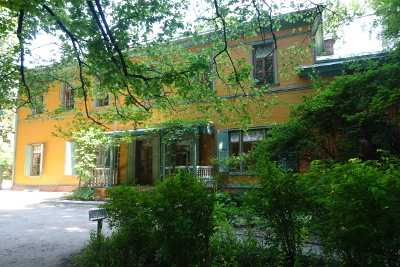
|
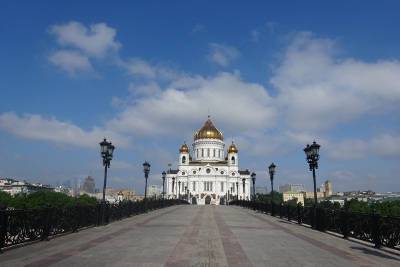 |
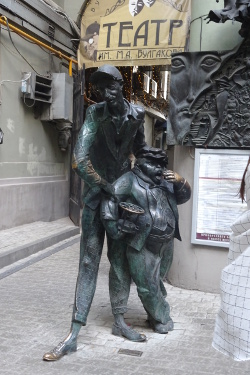 My literary day wasn't over yet though and I went out on my own again to meet a lovely local Moscovite who had offered me a Bulgakov tour near Tverskaya Boulevard where the great writer Michail Bulgakov had not only lived but also set his most famous novel The Master and Margarita in which the devil turns up in Moscow and creates havoc among the corrupt elite. A satire that didn't go down well with the powers that be in the Soviet Union and an uncensored version didn't come out until 1973. The book had first been recommended to me by a Russian I had met online years ago but I had no idea just how popular and beloved it is there - far more than Tolstoy, Dostoyevksy and their ilk.
The first scene is set at the lovely Patriarch's Pond (below right) before most of the action shifts to the infamous "Apartment no.50" at Sadovaya Street, where the Bulgakov Museum now resides. And I was really lucky to have a local with me because everything was only in Russian - and definitely worth seeing not just as an insight into the man's life but into a "regular" Moscovite flat during Soviet times. Oh and the strange chaps on the picture are the devil's assistants Azazello and Behemoth.
My literary day wasn't over yet though and I went out on my own again to meet a lovely local Moscovite who had offered me a Bulgakov tour near Tverskaya Boulevard where the great writer Michail Bulgakov had not only lived but also set his most famous novel The Master and Margarita in which the devil turns up in Moscow and creates havoc among the corrupt elite. A satire that didn't go down well with the powers that be in the Soviet Union and an uncensored version didn't come out until 1973. The book had first been recommended to me by a Russian I had met online years ago but I had no idea just how popular and beloved it is there - far more than Tolstoy, Dostoyevksy and their ilk.
The first scene is set at the lovely Patriarch's Pond (below right) before most of the action shifts to the infamous "Apartment no.50" at Sadovaya Street, where the Bulgakov Museum now resides. And I was really lucky to have a local with me because everything was only in Russian - and definitely worth seeing not just as an insight into the man's life but into a "regular" Moscovite flat during Soviet times. Oh and the strange chaps on the picture are the devil's assistants Azazello and Behemoth.
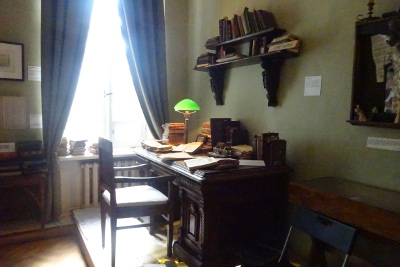
|
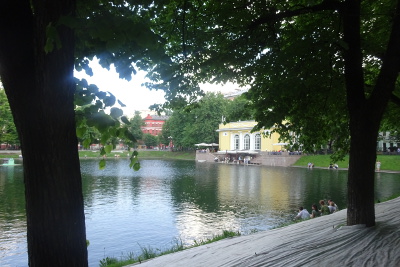 |
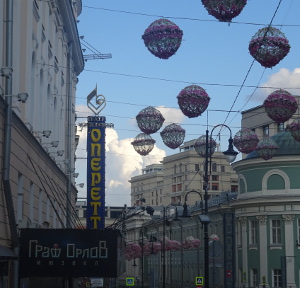 Parting ways again, I returned to the hotel for one last theatre evening, this time to see the musical Count Orlov at the Operetta Theatre, which was conveniently located behind the Bolshoi and thus also close to the hotel.
I had got the wrong end of the stick though, thinking it was about the Count Orlov who had been Catherine the Great's lover, so I was endlessly confused by the plot until Wikipedia afterwards brought enlightenment: This was his brother Alexei, admiral of the Mediterranean fleet, who had been sent by Catherine to honey-trap the Princess Tarakanova, who was going around Italy claiming she was the true heiress to the throne of Russia. Alexei lured her back to St.Petersburg where she was promptly arrested and died (under circumstances still unknown today) in the St. Peter and Paul Fortress. Whether the true Alexei ever loved her and showed some remorse later as in the musical is dubious but it was definitely a cracking good story well suited for a musical adaptation (even if the music was proper Eurotrash, inspired very obviously by our own Elisabeth musical).
Parting ways again, I returned to the hotel for one last theatre evening, this time to see the musical Count Orlov at the Operetta Theatre, which was conveniently located behind the Bolshoi and thus also close to the hotel.
I had got the wrong end of the stick though, thinking it was about the Count Orlov who had been Catherine the Great's lover, so I was endlessly confused by the plot until Wikipedia afterwards brought enlightenment: This was his brother Alexei, admiral of the Mediterranean fleet, who had been sent by Catherine to honey-trap the Princess Tarakanova, who was going around Italy claiming she was the true heiress to the throne of Russia. Alexei lured her back to St.Petersburg where she was promptly arrested and died (under circumstances still unknown today) in the St. Peter and Paul Fortress. Whether the true Alexei ever loved her and showed some remorse later as in the musical is dubious but it was definitely a cracking good story well suited for a musical adaptation (even if the music was proper Eurotrash, inspired very obviously by our own Elisabeth musical).
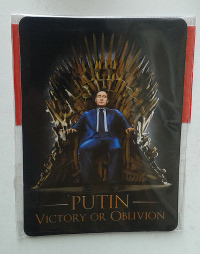 Seeing shows in a language you don't understand at all is a bit strange of course, but in the end, it beats being in bed at the hotel by 8pm and it was definitely a great finish to a very interesting trip before returning to Sheremetyevo Airport next morning (and Germany).
Just as with China not long ago I was pleasantly surprised by people's friendliness everywhere and generally by the lovely appearance of Moscow on the whole with far more charming old architecture than I had expected. Which only goes to show once more that Mark Twain was bang on the money when he said that travel is fatal to prejudice, bigotry and narrow-mindedness, because no matter what a tit the goon in charge of the Kremlin is right now, his citizens were universally lovely people and I had a great time in Moscow.
Seeing shows in a language you don't understand at all is a bit strange of course, but in the end, it beats being in bed at the hotel by 8pm and it was definitely a great finish to a very interesting trip before returning to Sheremetyevo Airport next morning (and Germany).
Just as with China not long ago I was pleasantly surprised by people's friendliness everywhere and generally by the lovely appearance of Moscow on the whole with far more charming old architecture than I had expected. Which only goes to show once more that Mark Twain was bang on the money when he said that travel is fatal to prejudice, bigotry and narrow-mindedness, because no matter what a tit the goon in charge of the Kremlin is right now, his citizens were universally lovely people and I had a great time in Moscow.
Copyright © All Rights Reserved